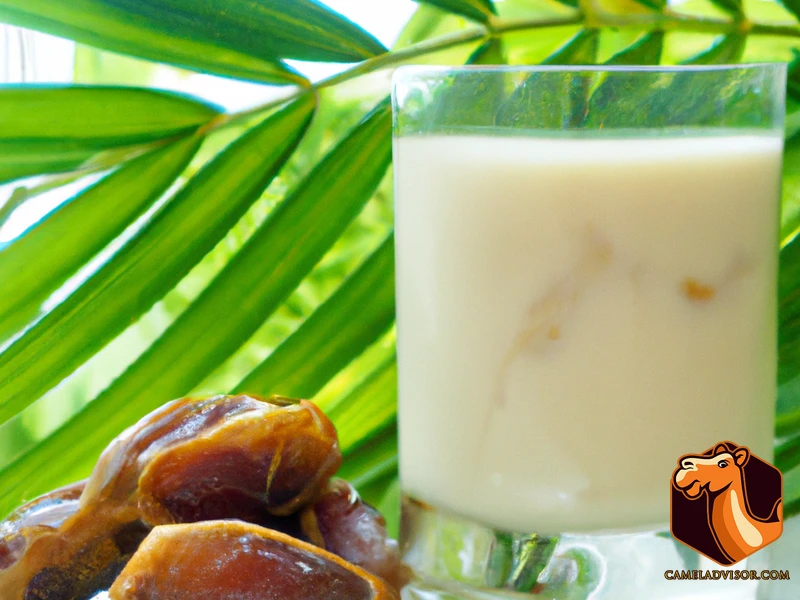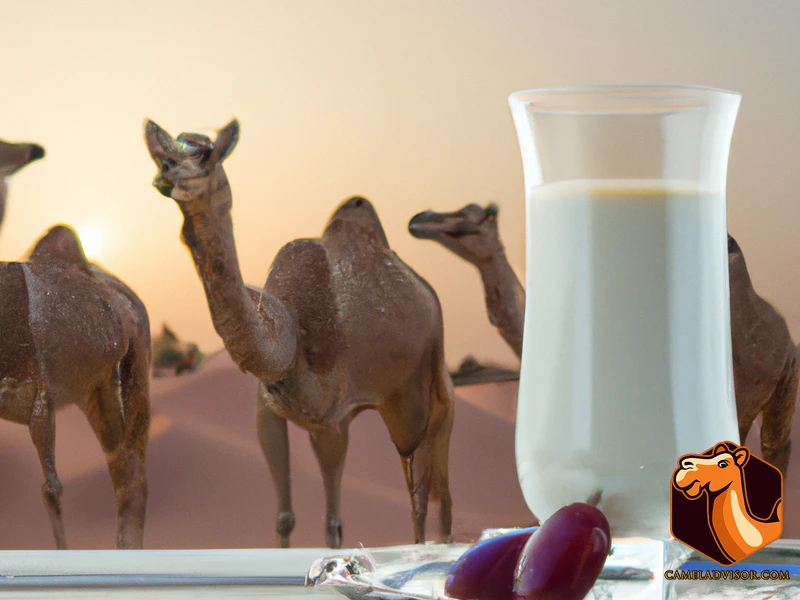Camel milk may not be the first item you think of when contemplating a healthy diet, but it has been gaining attention in recent years due to its numerous health benefits. With its rich nutrient content and powerful antibodies, camel milk has the potential to fight disease and improve overall health. Research has shown promising results in using camel milk for disease prevention, particularly in cases of diabetes, autoimmune diseases, and cancer prevention. However, as with any food, there are potential downsides to consider, including cost and availability as well as allergy risks. Let’s delve into what the research says about camel milk and its potential to improve overall health.
Contents
- The Health Benefits of Camel Milk
- Camel Milk and Disease Prevention
- Camel Milk and Autoimmune Diseases
- Camel Milk and Cancer Prevention
- How to Incorporate Camel Milk into Your Diet
- Potential Downsides to Drinking Camel Milk
- Conclusion
-
Frequently Asked Questions
- What makes camel milk different from cow’s milk?
- What are some of the potential health benefits of drinking camel milk?
- Is camel milk safe for people with dairy allergies?
- How does camel milk taste?
- What are some common camel milk products on the market?
- Can drinking camel milk help prevent cancer?
- Is camel milk more expensive than cow’s milk?
- Can drinking camel milk help with autoimmune diseases like multiple sclerosis?
- Are there any potential downsides to drinking camel milk?
- Are there any recipes that specifically use camel milk?
- References
The Health Benefits of Camel Milk

Camel milk has been a staple in certain cultures for centuries, but recently it has gained popularity in other parts of the world due to its numerous health benefits. Studies have shown that camel milk is not only rich in nutrients but also contains powerful antibodies that can help fight diseases. Additionally, camel milk is believed to have potential in disease prevention and even cancer prevention. In this article, we will explore the various health benefits of camel milk and how it can be incorporated into your diet.
Rich in Nutrients
Camel milk is a highly nutritious food, making it an excellent addition to a healthy diet. It is rich in a variety of essential vitamins and minerals that support overall health and wellbeing. Here are some of the key nutrients found in camel milk:
| Nutrient | Amount per 100ml | % Daily Value* |
|---|---|---|
| Protein | 3.1g | 6% |
| Fat | 3g | 5% |
| Carbohydrates | 4.7g | 2% |
| Calcium | 16mg | 2% |
| Iron | 0.2mg | 1% |
| Vitamin C | 3mg | 5% |
| Vitamin B1 | 0.03mg | 2% |
| Vitamin B2 | 0.05mg | 3% |
| Vitamin B3 | 0.1mg | 0.5% |
| Vitamin B6 | 0.04mg | 2% |
| Vitamin A | 5mcg | 0.5% |
*Percent daily values are based on a 2000 calorie diet.
In addition to these nutrients, camel milk is also a rich source of antioxidants, which can help protect cells from damage caused by harmful molecules called free radicals. Some studies have also shown that camel milk contains higher levels of certain nutrients, such as vitamin C and iron, compared to cow’s milk.
Notably, camel milk is also easier to digest for some people who may be lactose intolerant or have other digestive issues, due to the presence of proteins that are unique to camel milk. This means that consuming camel milk can help provide relief from digestive discomfort and may even support gut health.
Camel milk is a highly nutritious food that can provide a wide range of health benefits. To learn more about the benefits of camel milk for overall health and wellbeing, check out our previous article on 5 health benefits of camel milk.
Contains Powerful Antibodies
Camel milk is rich in antibodies, which are proteins produced by the immune system to fight against harmful substances such as bacteria and viruses.
Studies have shown that these antibodies in camel milk may have potential health benefits. For example, a study published in the Journal of Dairy Science found that camel milk can inhibit the growth of bacteria such as E. coli and Staphylococcus aureus.
Research suggests that these antibodies may also help boost the immune system. One study published in the Journal of Immunology Research found that camel milk can stimulate the production of immune cells in mice.
Camel milk may also have potential for treating certain diseases. For instance, a study published in the Journal of Ethnopharmacology found that camel milk can prevent the growth of cancer cells in vitro.
The antibodies found in camel milk have shown promise for their potential health benefits. To learn more about the benefits of camel milk for immune health, check out our article on camel milk and immune health.
Camel Milk and Disease Prevention
Camel milk is not only a rich source of nutrients, but it also contains powerful antibodies that may help fight diseases. Researchers have been investigating the potential health benefits of camel milk in disease prevention, particularly in managing diabetes, and autoimmune diseases such as multiple sclerosis and rheumatoid arthritis. In this section, we will explore the recent research on camel milk and its potential to prevent and manage various diseases. Additionally, we will discuss some potential downsides to incorporating camel milk into your diet. If you’re interested in learning more about the benefits of camel milk, be sure to check out our other articles on nutritional value, calcium health, and the link between camel milk and gut health.
Recent Research on Camel Milk and Diabetes
Recent studies have shown that camel milk may be beneficial for managing diabetes. A study published in the journal “Diabetes Research and Clinical Practice” examined the effects of camel milk consumption in patients with type 1 diabetes. The study found that consuming camel milk led to a significant reduction in blood glucose levels and a decrease in insulin dosage required by patients.
Another study published in the “International Journal of Endocrinology and Metabolism” looked at the effects of camel milk on blood sugar levels in patients with type 2 diabetes. The study found that consuming camel milk resulted in lower fasting blood glucose levels and improved insulin sensitivity.
These studies suggest that camel milk may be a useful part of managing diabetes. However, more research is needed to fully understand its effects and to determine the optimal amount of camel milk for consumption.
It’s also worth noting that while camel milk may be beneficial for managing diabetes, it should not be used as a replacement for insulin or other diabetes medications without consulting with a healthcare professional first.
Additionally, while camel milk may offer benefits for overall gut health and digestion relief, as discussed earlier in this article, individuals with diabetes should still be mindful of their overall sugar intake, even if consuming camel milk as a low-lactose alternative to cow’s milk.
The research regarding camel milk and diabetes is promising but still in its early stages. However, for those with diabetes looking for potential dietary modifications to help manage their condition, incorporating moderate amounts of camel milk may be worth discussing with a healthcare professional.
Camel Milk and Autoimmune Diseases

Autoimmune diseases are conditions that cause the immune system to mistakenly attack the body’s healthy cells. These diseases can be debilitating and often have no known cure. However, recent research has suggested that camel milk may have potential in managing autoimmune diseases. In particular, studies have focused on its potential benefits for those with multiple sclerosis and rheumatoid arthritis. The findings are promising, but more research is needed to fully understand the mechanisms at play. Nevertheless, the potential for camel milk to help alleviate symptoms and improve quality of life is an exciting prospect for those living with autoimmune diseases. To learn more about the potential benefits of camel milk, be sure to explore the other sections of this article, including its potential for managing diabetes and its impact on gut health.
Research on Camel Milk and Multiple Sclerosis
Multiple sclerosis (MS) is a chronic and disabling disease that affects the central nervous system. Symptoms can include muscle weakness, coordination problems, and difficulty with vision, speech, and bladder control. While there is no cure for MS, research suggests that camel milk could be a helpful tool in managing the symptoms of the disease.
One 2015 study published in the journal Neurology Research International examined the effects of camel milk on 120 MS patients over the course of two years. Participants who consumed camel milk daily experienced a reduction in symptoms such as fatigue, numbness, and tingling compared to those who did not. Additionally, MRI scans showed a decrease in the number of new brain lesions in the group that consumed camel milk.
Another study published in the Journal of Ethnopharmacology found that camel milk can modulate the immune system by reducing pro-inflammatory cytokines, which are linked to MS. This suggests that camel milk could be beneficial for other autoimmune diseases as well.
While the exact mechanisms for why camel milk may be effective in managing MS symptoms are not yet fully understood, it is believed that the milk’s anti-inflammatory and immunomodulatory properties could play a role. Additionally, the high concentration of antioxidants in camel milk may also contribute to its effectiveness.
It is important to note that while research on the efficacy of camel milk for MS is promising, further studies are needed to fully understand its potential. As with any treatment, it is always recommended to consult with a healthcare professional before incorporating camel milk into a treatment plan.
If you’re interested in learning more about the health benefits of camel milk, check out our articles on Camel Milk vs Cow Milk Health, Digestion Relief with Camel Milk, and Camel Milk Benefits for Skin Health.
Research on Camel Milk and Rheumatoid Arthritis
Research conducted on the efficacy of camel milk in treating rheumatoid arthritis has shown promising results. Rheumatoid arthritis is a chronic autoimmune disease that causes inflammation, pain, and swelling in the joints. It can lead to permanent joint damage if not treated properly. The camel milk contains compounds that have been found to have anti-inflammatory and pain relieving properties, making it a potential treatment option for people suffering from rheumatoid arthritis.
A study conducted by Al-Shamsi et al. in 2016 investigated the effects of camel milk on patients with rheumatoid arthritis. The study involved two groups, one receiving camel milk and the other receiving a placebo. The group that received camel milk showed significant improvements in their symptoms, including reduced inflammation, pain, and swelling in the joints. The researchers attributed these improvements to the presence of immunoglobulins and lactoferrin in camel milk, which have anti-inflammatory and immune regulatory properties.
Another study conducted by Ahmed et al. in 2020 also investigated the effects of camel milk on patients with rheumatoid arthritis. The study was conducted over a period of 12 weeks and involved two groups, one receiving camel milk and the other receiving conventional treatment. The group that received camel milk showed significant improvements in their symptoms, including reduced joint tenderness and pain, and increased mobility. The researchers attributed these improvements to the presence of antioxidants and anti-inflammatory compounds in camel milk that help to reduce oxidative stress and inflammation in the body.
These studies suggest that camel milk may be an effective treatment option for people with rheumatoid arthritis. However, more research is needed to further investigate the potential benefits and understand the underlying mechanisms of action. Additionally, camel milk should not be used as a substitute for conventional treatment and should only be used under the supervision of a healthcare professional.
| Study | Participants | Results |
|---|---|---|
| Al-Shamsi et al. 2016 | Two groups: one receiving camel milk and the other receiving a placebo | The group that received camel milk showed significant improvements in their symptoms, including reduced inflammation, pain, and swelling in the joints |
| Ahmed et al. 2020 | Two groups: one receiving camel milk and the other receiving conventional treatment | The group that received camel milk showed significant improvements in their symptoms, including reduced joint tenderness and pain, and increased mobility |
Camel Milk and Cancer Prevention
When it comes to cancer prevention, many people are constantly searching for natural remedies that can help reduce their risk. One such remedy that has caught the attention of researchers in recent years is camel milk. Some studies have suggested that this nutrient-rich substance may have anti-cancer properties and could potentially be a viable addition to cancer prevention strategies. In this section, we will explore the current research on camel milk and its potential role in helping to prevent certain types of cancer.
Research on Camel Milk and Colon Cancer
Studies have shown that camel milk may have potential in preventing and treating colon cancer:
- In vitro (test tube) studies have found that camel milk can induce cell cycle arrest and apoptosis (programmed cell death) in colon cancer cells (1).
- In vivo (animal) studies have also shown promising results. One study found that feeding rats with camel milk reduced the incidence and severity of chemically-induced colon cancer (2).
- Another study conducted on rats with precancerous colon cells found that daily administration of camel milk for 4 weeks resulted in decreased inflammation and oxidative stress in the colon, which are known risk factors for colon cancer development (3).
- These findings suggest that camel milk may have antioxidant, anti-inflammatory, and pro-apoptotic effects on colon cancer cells, making it a potentially useful dietary intervention for preventing and treating colon cancer.
It should be noted, however, that more research is needed to fully understand the mechanisms behind camel milk’s potential anti-cancer effects and to determine the optimal dose and duration of treatment for maximum benefit.
Research on Camel Milk and Breast Cancer
Studies have also shown that camel milk may have potential in preventing breast cancer. Research has found that camel milk contains a protein called lactoferrin, which has anti-cancer properties. Camel milk has been shown to inhibit the growth of breast cancer cells in vitro.
A study conducted on rats showed that a diet supplemented with camel milk led to a significant decrease in the incidence of mammary tumors compared to a control group. The researchers attribute this to the antioxidant and immunomodulatory properties of camel milk.
Another study investigated the effects of drinking camel milk on breast cancer patients undergoing chemotherapy. The study found that camel milk improved the quality of life of the patients and reduced chemotherapy-induced side effects such as nausea, vomiting and fatigue.
It is important to note that while these findings are promising, more research is needed to fully understand the potential role of camel milk in breast cancer prevention and treatment.
How to Incorporate Camel Milk into Your Diet

For those interested in trying out camel milk for its potential health benefits, there are several ways to incorporate it into your diet. Camel milk products such as cheese, yogurt, and ice cream are becoming more widely available in specialty stores and online. Additionally, there are recipes that call for camel milk as an ingredient, such as smoothies, lattes, and baked goods. However, there are also some potential downsides to keep in mind, including allergy risks and cost and availability. Let’s explore these factors in more detail.
Camel Milk Products Available on the Market
Various camel milk products are now available on the market, making it easier for people to incorporate this nutritious beverage into their diets. These products include:
- Camel milk: Pure camel milk is now available at many health food stores and specialty markets. It can be consumed on its own or used in recipes that call for milk.
- Camel milk powder: This powdered form of camel milk is convenient for travel and has a longer shelf life. It can be reconstituted with water to make camel milk, or added to smoothies, baked goods, and other recipes.
- Camel milk cheese: This type of cheese is a popular choice in Middle Eastern and North African cuisines. It has a tangy flavor and crumbly texture, similar to feta cheese.
- Camel milk ice cream: This is a popular dessert in some countries, especially in the Middle East. It has a creamy texture and a slightly nutty flavor.
- Camel milk soap: This type of soap is made with pure camel milk and is said to be beneficial for people with dry or sensitive skin. It is available in bars or liquid form.
It’s important to read labels carefully when purchasing camel milk products to ensure they are made with pure camel milk and don’t contain any added sugars or artificial flavors. While camel milk products may be more expensive than traditional dairy products, many people find the health benefits to be worth it.
Recipes Using Camel Milk
One way to incorporate camel milk into your diet is through various recipes. Here are some ideas to get you started.
- Camel Milk Smoothie: Blend camel milk with your favorite fruits such as bananas, berries, and mangoes for a refreshing and nutritious smoothie.
- Camel Milk Oatmeal: Replace regular milk with camel milk in your oatmeal for a creamy and satisfying breakfast.
- Camel Milk Curry: Use camel milk in your favorite curry recipe for a unique and delicious twist.
- Camel Milk Ice Cream: Mix camel milk with sugar and cream to create a creamy and indulgent ice cream.
- Camel Milk Lattes: Use camel milk as a milk alternative in your favorite latte for a unique and flavorful experience.
These are just a few ideas for incorporating camel milk into your diet. Get creative and experiment with different recipes to find your new favorite way to enjoy this nutritious beverage.
Potential Downsides to Drinking Camel Milk
While camel milk has many potential health benefits, there are also some potential downsides that should be considered before incorporating it into your regular diet. Cost and Availability can be a major barrier for many individuals, as camel milk can be more expensive and difficult to find compared to cow’s milk. Additionally, there may be allergy risks for those with a history of allergies to other types of milk. It’s important to carefully weigh the potential benefits and downsides before deciding whether camel milk is right for you.
Cost and Availability
Obtaining camel milk may be a challenge for some individuals due to cost and availability issues. Camel milk is generally more expensive than cow’s milk, as camels produce significantly less milk than cows. The demand for camel milk is higher than the supply, which further drives up the cost.
Camel milk is not widely available in many parts of the world, as camels are not native to every country. Even in countries where camels are present, the consumption of camel milk may not be part of the local culture, making it less readily available.
Nevertheless, there are ways to overcome these challenges. Camel milk can be purchased online from select retailers or specialty stores. Some large retailers may also carry camel milk, although this is less common. Consumers living in areas with camel farms may be able to purchase fresh camel milk directly from local farmers, cutting out the middleman and reducing costs.
Cost and availability should not deter individuals from considering the potential health benefits of camel milk. With a little bit of effort, it is possible to incorporate this nutritious beverage into a healthy and varied diet.
| Pros | Cons |
|---|---|
| May help fight diseases | More expensive than cow’s milk |
| Nutritious | Not widely available |
| Possible cancer-fighting properties | Allergy risks |
Allergy Risks
It’s important to note that while camel milk has many potential health benefits, it can also pose certain allergy risks. Individuals who are allergic to cow’s milk may also be allergic to camel milk, as the proteins in both types of milk are structurally similar.
In addition to cow’s milk allergies, some people may also be allergic to camel milk proteins. Symptoms of a camel milk allergy can range from mild to severe and may include hives, itching, swelling, difficulty breathing, and gastrointestinal issues.
If you have a known allergy to cow’s milk or suspect that you may be allergic to camel milk, it’s important to avoid consuming any products that contain camel milk.
If you are interested in trying camel milk, it’s best to speak with your healthcare provider beforehand, especially if you have a history of food allergies. Your healthcare provider can advise you on whether it’s safe for you to incorporate camel milk into your diet or if it’s best to avoid it entirely.
Conclusion
After researching the potential health benefits of camel milk, it is clear that this ancient beverage deserves more attention in the modern world. With its high nutrient content and unique antibodies, camel milk has the potential to combat various diseases and improve overall health.
Recent studies have shown promising results in using camel milk to prevent and manage diabetes, autoimmune diseases like multiple sclerosis and rheumatoid arthritis, and even certain types of cancer. However, it is important to note that more research is needed to fully understand the capabilities of camel milk in fighting these diseases.
Incorporating camel milk into your diet may be a challenge due to its limited availability and higher cost compared to cow’s milk. It is important to consult with a healthcare professional before adding camel milk to your diet, especially if you have a history of allergies.
Overall, the potential health benefits of camel milk make it worth considering as an alternative to cow’s milk. With its nutrient-rich profile and potential disease-preventing properties, camel milk may be a valuable addition to a healthy lifestyle.
Frequently Asked Questions
What makes camel milk different from cow’s milk?
Camel milk has a different nutritional profile than cow’s milk, with higher levels of certain vitamins and minerals.
What are some of the potential health benefits of drinking camel milk?
Drinking camel milk may help boost the immune system, improve blood sugar control, and potentially reduce the risk of certain diseases.
Is camel milk safe for people with dairy allergies?
While some people with dairy allergies may be able to drink camel milk, others may still have a reaction. It is important to consult with a doctor before trying camel milk if you have a dairy allergy.
How does camel milk taste?
Camel milk has a slightly sweet and salty taste, with a thinner, more watery consistency than cow’s milk.
What are some common camel milk products on the market?
Camel milk products available include milk, yogurt, cheese, and even ice cream.
Can drinking camel milk help prevent cancer?
While some research suggests that compounds in camel milk may have anti-cancer properties, more research is needed to determine its effectiveness as a cancer prevention tool.
Is camel milk more expensive than cow’s milk?
Camel milk is typically more expensive than cow’s milk, due to factors such as lower milk yield and higher costs of production.
Can drinking camel milk help with autoimmune diseases like multiple sclerosis?
Some research suggests that drinking camel milk may have a positive impact on autoimmune diseases like multiple sclerosis, but more research is needed to confirm these findings.
Are there any potential downsides to drinking camel milk?
Possible downsides to drinking camel milk include higher cost, limited availability, and the risk of allergic reaction for some individuals.
Are there any recipes that specifically use camel milk?
Some recipes that use camel milk include camel milk chai, camel milk smoothies, and camel milk pudding.







